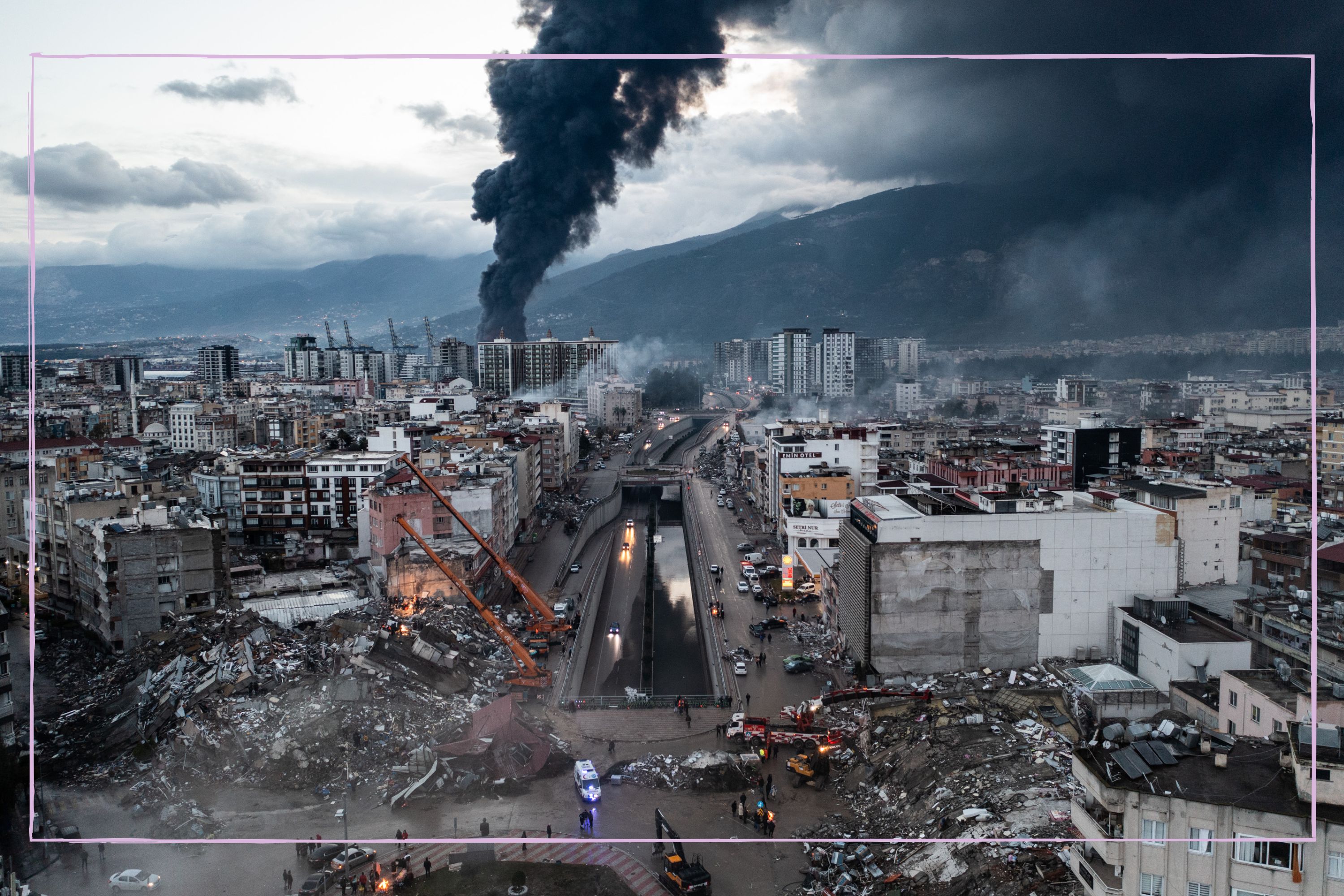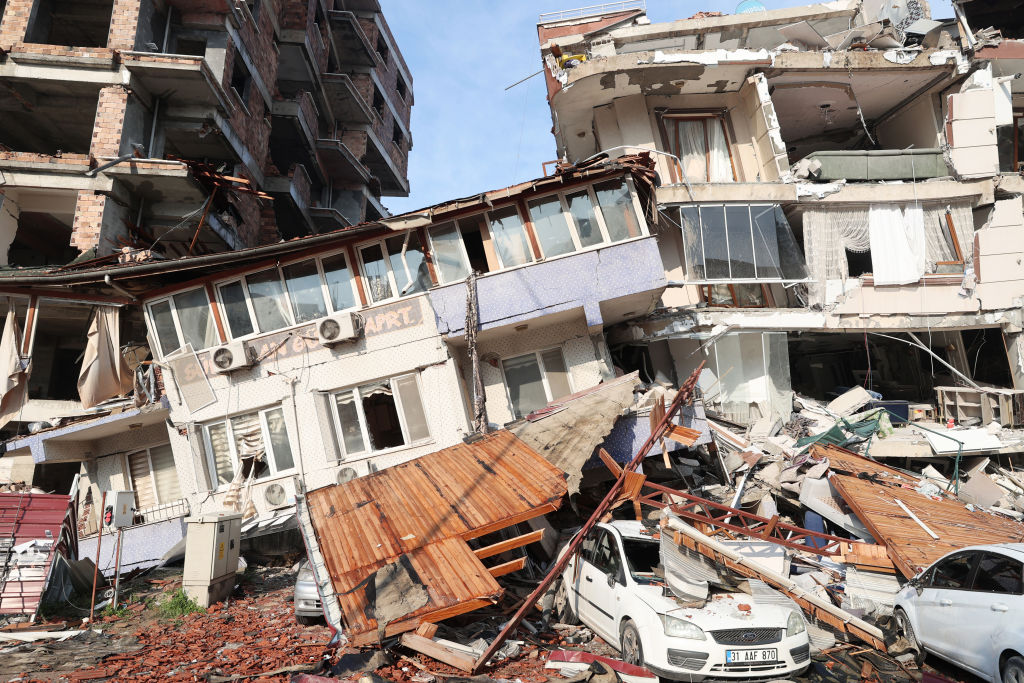Which parts of Turkey were hit by the earthquake?
Where and when the earthquakes struck in Turkey and Syria.


Parenting advice, hot topics, best buys and family finance tips delivered straight to your inbox.
You are now subscribed
Your newsletter sign-up was successful
Find out which parts of Turkey were hit by the earthquake and where in Syria is affected too.
Situated on one of the world's most active earthquake zones, the country of Turkey has always been vulnerable to tremors and volcanic activity. But the two earthquakes that occured on Monday 6 February 2023 recorded magnitudes not seen in over 80 years, leaving with it unprecendented destruction and a harrowing death toll that is expected to rise. Many charities across the UK have organised for people to donate clothes to Turkey in wake of the event.
Here's the cities and regions that were the worst affected by the earthquakes and whether holiday destinations like Turkey's Antalya were affected by the natural disaster.
Which parts of Turkey were hit by the earthquake?
According to Turkey's interior minister Suleymon Soylu the parts of Turkey most affected by the recent earthquakes are the cities of Gaziantep, Kahramanmaraş, Sanliurfa, Diyarbakir, Adana, Adiyaman, Malatya, Osmaniye, Hatay, and Kilis.
Two earthquakes took place in south-eastern Turkey on February 6, 2023. The first hit north of the city of Gaziantep, with the second earthquake following hours later just north-east of Kahramanmaraş - 60 miles north from where the first quake struck. The areas affected by the quakes are in Turkey's south-eastern region, which is roughly 60 miles from the Syrian border. Northern Syria was also affected as a result.
Check here for updates on the recent Turkey earthquakes: https://t.co/PbcP4dcjcc #Turkey pic.twitter.com/AliAaaD3G0February 6, 2023
According to the US Geological Survey (USGS), the first earthquake was a 7.8 magnitude earthquake which struck at 04:17 am local time (01:17 GMT). The second quake was recorded as a 7.5 magnitude earthquake which hit at 1:24 pm (10:24 GMT).
Thousands of buildings, homes and roads have collapsed and been destroyed in the wake of the natural disaster. Gaziantep Castle, a Turkish landmark that has stood for over 2,000 years was also destroyed as a result of the quake. Search and rescue operations continue to be underway in Turkey. The death toll in Syria and Turkey at the time of writing exceeds 16,000.
Parenting advice, hot topics, best buys and family finance tips delivered straight to your inbox.
Tremors from the two earthquakes were felt as far away as Lebanon, Egypt and Cyprus. A tsunami warning was also briefly issued by Italian authorities along it's coastline in the aftermath.
Putting the size of Turkey's earthquakes into perspective - The Guardian reports that the first earthquake "was the worst to strike Turkey this century." The last time a 7.8 earthquake was recorded in Turkey was in December 1939.
On average less than 20 earthquakes a year exceed a 7.0 magnitude - according to Dr David Rothery, Professor of Planetary Geosciences at The Open University. He told the Daily Mail: "The shaking at the ground surface will have been more severe than for a deeper earthquake of the same magnitude at source."

The aftermath of the earthquakes in Turkey show buildings devastated in Kahramanmaras.
Was Antalya affected by the earthquake?
Popular Turkish holiday destination Antalya was not hit by the earthquakes and is over 800km/400 miles away from the sites that were directly affected. Nevertheless a state of emergency has been declared across Turkey with after-shocks ongoing.
Cycling event The Tour of Antalya has been called off following Monday's earthquakes. The four-stage race was scheduled to take place this week in Turkey. A 7-day period of national mourning has also been declared by the Turkish government following the natural disaster. This is likely to have knock on effects on daily life in Antalya and indeed the rest of Turkey.
In terms of travel to Antalya - no airlines that fly from the UK to Turkey have announced flight cancellations following the earthquake. As for Britain's Foreign, Commonwealth and Development Office (FCDO), current advice remains to “avoid the Southeast region of Turkey". Only essential travel is permitted to the city of Sirnak and the Turkish province of Hakkari, civilians are also advised against travelling to areas within 10km of the border with Syria.
Which parts of Syria were hit by the earthquake?
North-west Syria was hit by the recent earthquakes, with the cities of Aleppo, Hama, Latakia and Tartus reporting over 1,500 civilian deaths in the aftermath. The province of Idlib in Syria has been highlighted as one of the areas worst hit by the natural disaster.
Aleppo was already in a fragile condition given the Syrian civil war that has been raging on there for over 12 years. The conflict centres around a Syrian uprising against the Government of Syria and its leader, President Bashar al-Assad. Rebel forces fighting against the regime include the Free Syrian Army (FSA), Kurdish Rebel Fighters (so-called Islamic State) , Jabhat Fath al-Sham, Hezbollah and the Syrian Democratic Forces (SDF).
In Syria, the earthquakes hit the country’s war-ravaged north. Hundreds were killed in the cities of Aleppo, Hama, Latakia and Tartus, according to the Syrian Health Ministry. Damage was seen in at least 16 Syrian cities. See more: https://t.co/1cctRKf2Jz pic.twitter.com/e6oJsBCeo5February 7, 2023
As in Turkey, search and rescue missions remain underway in Aleppo following the earthquakes, though there's concern around getting aid to those in need due to the damage (from both the war and earthquakes).
"The infrastructure is damaged, the roads that we used to use for humanitarian work are damaged, we have to be creative in how to get to the people … but we are working hard," UN resident coordinator, El-Mostafa Benlamlih, told Reuters news agency.
Video of the Week

Emily Stedman is the former Features Editor for GoodTo covering all things TV, entertainment, royal, lifestyle, health and wellbeing. Boasting an encyclopaedic knowledge on all things TV, celebrity and royals, career highlights include working at HELLO! Magazine and as a royal researcher to Diana biographer Andrew Morton on his book Meghan: A Hollywood Princess. In her spare time, Emily can be found eating her way around London, swimming at her local Lido or curled up on the sofa binging the next best Netflix show.